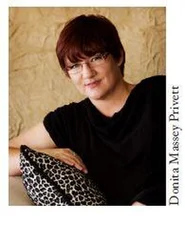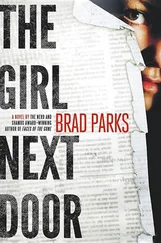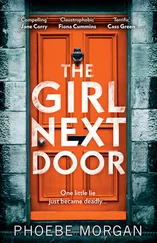It was October, better than summer because he need not hurry with disposal of the bodies. Now that he had removed the offending hands, the hands that had held each other, he hardly knew why he had. To look at them? To remind him of his vengeance? But the hand-holding was in the past, and now was the present. He knew he would scarcely want to contemplate those hands in a day or two’s time. What he might do was bury them; knowing they were there, hidden, and whose they were, would be enough. He wrapped the bodies in bedsheets and tied them up with garden string.
The child slept through it. He was only just nine, old enough to see everything that went on even if not understanding most of it. Woody knew he would have to get rid of him. Not that he intended the same fate for him that he had meted out to Anita and her lover. Michael was his son, he knew that, anyone would, for the child was lucky enough to look exactly like him. While not feeling anything like love for him, he nevertheless had a kind of tie of blood with the boy. Michael was his , and now his mother was gone, the nearest human being in the world to him. He could arrange never (or very seldom) to see him again, but shedding his blood, as he put it, was not to be thought of.
The bodies in their bedsheet shrouds he had stowed in the summer house and covered with firewood. The lid on the biscuit box fitted tightly, so there was no smell. He kept the box in Anita’s wardrobe, underneath those dresses she was always buying, but he knew he must find some permanent resting place. He slept in the room where he had killed them and sometimes he contemplated the box, but he never attempted to remove the lid. The process of decay would have begun, and he was afraid of what he would see and smell if he prised open the lid.
He had known for a couple of months where Michael went when he was out playing with the Johnson boy and the Norris boy and those Batchelors from Tycehurst Hill and lovely Daphne Jones and the little kid Rosemary something. He knew they played underground. He watched Michael cross The Hill. He waited half an hour, and then he went across the road and up to the entrance to the tunnels. The children were inside, but he couldn’t see them from where he stood. He shouted out to them. ‘I know you’re in there. Come out now. Your games are over. Time you went home, and don’t come back. D’you hear me?’
They heard him. One by one they came out. Daphne stayed behind to blow out the candles. She was the last to leave, and standing on the wet grass at the top, she gave him her mysterious smile, turning her head away.
Next day, a policeman came. He wanted to speak to Mrs Winwood. Woody gave him his prepared story. His wife had been ill and was staying with her cousin in the country to convalesce. The policeman didn’t explain why he wanted to speak to Anita, or if he was suspicious. He went away.
Sending the boy to Auntie Midge was not to be thought of – she was too old and too poor – but how about his sort-of-cousin Zoe? She couldn’t have kids and said she longed for them, God knows why. She was thinking of adoption but hadn’t fixed on a child; had seen Michael a couple of times and mooned after him the way some women did. Adoption was easy: more or less the parents’ consent had to be secured and you took the kid over. Zoe had just got married, a bit late in the day but never mind that, and there was plenty of money. She wanted the kid so much she didn’t want to know where Anita was, or even that she had gone. It was soon arranged.
When the day came, he was so anxious to get the house to himself that he took the kid to the station on the Underground quite early in the morning and more or less pushed him into the Lewes train. The sandwiches he had made he forgot, left them behind on the kitchen counter. But the boy wouldn’t want to eat sandwiches in the middle of the morning. Woody had only one regret at seeing the last of his son. It seemed a shame to lose sight of such a good-looking kid. He got on a bus and off it when it turned down Knightsbridge. A jeweller in a shop full of rings and pearl necklaces bought Anita’s engagement and wedding rings off him for close on a thousand pounds. Enough to buy a fine house with, only he didn’t want a house. He had one and would sell it as soon as the war was over. The jeweller asked no questions.
Woody was free. But was he? Not while the bodies lay under the firewood in the summer house. He was actually contemplating them from the summer house doorway when Mrs Mopp came down the garden to tell him a police officer was asking to see him. Woody shut the door and locked it. Not one policeman this time, but two. His wife was seriously ill, he said, and he was going up to Yorkshire later that day to join her. They seemed to accept that, but made no answer when he asked them, inwardly trembling, what made them ask.
Not while he had the white hand and the brown hand in the biscuit tin. The latter was easily disposed of, secreted in a place where only he could find it when the time came to contemplate those hands again, to remind himself. Since he had driven that bunch of kids out, none had returned, and now it was winter, too cold and wet for visiting the tunnels. One cold, wet November evening, pitch dark, he had shone his torch down the steps into the tunnels and followed its beam of light, carrying the biscuit box. In spite of the tarpaulin covering, the whole place was growing waterlogged, the only sound the slow, steady dripping of water on to water. He must be careful. It would be a fine thing if he slipped and fell and, with those hands in his hands, had to shout for help. Would he ever be found?
Woody stood still, thinking, staring down a deep hole, from which the yellowish clay-thickened water seemed to be draining away. He could hardly see its bottom, only knowing that down there the liquid was finding a way out. Resting the torch on the lip of the hole, he squatted down and slid the tin over the edge. The light showed him that it had slipped down into the muddy wetness, then by its weight pushed aside some obstacle and disappeared from view. He got to his feet, slipped a little, knocking the torch into the hole. The darkness was absolute. He turned round, telling himself to keep calm, not to panic, and struggled, foot placed carefully in front of foot, hands clutching at the tufts of rank grass that grew here and there from the clayey walls. A little light showed ahead of him, light from the moon it must be, because there were no street lamps. He clambered up the slippery steps, sliding back once, then again, until at last – and by this time he could see the source of light, a full round moon – he emerged on to the grass of the field.
By the moonlight he could see that he was caked with mud, yellow filth, his hands and arms, his feet and his trousers halfway up his thighs. No one was about. Few people ever were on these wartime evenings. And there was silence, not a light showing, not a note of music heard, not a word spoken, not a child’s cry. As he opened the gate and let himself into his garden, he glanced at the Joneses’ house next door, at the faint strand of light showing underneath the blackout curtain, which he thought might be Daphne’s room. Lovely Daphne – if she was only a bit older and had money, she might become his next wife.
He let himself into the house by the back door, taking a look at the summer house from the doorstep. What a way out of his difficulty that would be, to get those bodies, the man’s and the woman’s, across the road and slide them down the hole as he had slid their hands. But impossible. He would be seen. He had no car, he couldn’t drive. The idea must be given up and the only way would be to destroy the bodies by fire before the police returned to search the place.
It was only after the fire had burned the bodies and wrecked the garden that he realised he could never inherit Anita’s money because as far as anyone knew she wasn’t dead. Officially, to the police or the lawyers or her relatives, she could never die. There was no certificate, no funeral, no will, no death notice. He looked at himself in the mirror and thought, my face is my fortune, always remember that. A headline in a newspaper told him that a direct hit had destroyed the police station in Woodford, which was only a few miles from Loughton. A lot of officers had been killed and Woody wondered if this was why the police had failed to come back. They had forgotten about him and let him alone. No one ever called him Woody again.
Читать дальше












